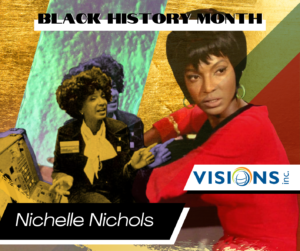Nichelle Nichols is the Best Thing to Have Ever Happened to NASA by Beca Oliveira

Nichelle Nichols is the Best Thing to Have Ever Happened to NASA by Beca Oliveira
When Star Trek premiered on NBC in 1966, Lt. Nyota Uhura, played by then-Broadway actor Nichelle Nichols, was something never before seen on American television: A Black woman with Real Authority over white men. As Chief Communications Officer, Uhura was head of her own department and a bridge officer, one of the top five officers aboard the galaxy-exploring USS Enterprise.
This was such a huge deal at the time that the network refused to make Nichols a series regular. She was, instead, for the three seasons Star Trek ran, a “recurring character” – it came with a higher daily pay rate, but it kept her name off the opening screen credits.
Unimpressed with her deal, Nichols planned to quit after the first season to pursue an opportunity on Broadway, until, quite by chance, she was introduced to her “Number One Fan” at a NAACP banquet: Dr. Martin Luther King, Jr.
He said that Star Trek was the only show that he and his wife Coretta would allow their three little children to stay up and watch, Nichols said in a 2013 “Archive of American Television” interview.
“For the first time on television, we [Black People] will be seen as we should be seen everyday– as intelligent, quality, beautiful, people who can sing, dance, and go into space,” she recalled Dr. King saying to her. “Gene Roddenberry [Star Trek’s creator] has opened a door for the world to see us. If you leave, that door can close. Your role is not a black role, it’s not a female role, he can fill it with anybody, even an alien.”
She rescinded her resignation, much to Roddenberry’s delight. She remained a recurring character for the two further seasons Star Trek had, paving the way for me to discover her utter amazingness through syndication.
Uhura’s best line on that show is a response. Some alien calls her “fair maiden.” Like the utter boss she is, Uhura replies, “Sorry, neither.” That exemplifies the take-no-nonsense attitude Uhura always showcased: always in charge of herself, always about her duties, always flawlessly accessorized (those earrings!).
Ten years after the cancellation of Star Trek, Nichols was recruited to participate in a NASA special project: recruiting minority and female personnel for the space agency. NASA applicants who were not White men were “staying away in droves,” she told Smithsonian Magazine in 2011. She did not believe NASA was serious about expanding their recruitment efforts, but after assurances, she agreed.
“I said OK. I will do this and I will bring you the most qualified people on the planet, as qualified as anyone you’ve ever had and I will bring them in droves. And if you do not pick a person of color, if you do not pick a woman, if it’s the same old, same old, all-white male astronaut corps, that you’ve done for the last five years, and I’m just another dupe, I will be your worst nightmare,” she said in that Smithsonian interview.
Mae Jemison, the only NASA astronaut to ever play a character on Star Trek, and the first Black woman in space, credits Nichols for her joining NASA – for both the example on Star Trek, and for her recruitment to NASA.Other Nichols NASA recruits include Dr. Sally Ride, the first female and first queer American astronaut; United States Air Force Colonel Guion Bluford, the first African-American astronaut; and Charles Bolden, former NASA administrator and veteran of four shuttle missions.
Nichols’ work with NASA is given significant focus in the documentary “Woman in Motion.” She was also the first female Black American actor to place her handprints in front of Hollywood’s Grauman’s Chinese Theatre.
Tragically, since a stroke and a dementia diagnosis in the mid-2010s, 89-year-old Nichols has been caught in a Britney Spears-type conservatorship battle between her son, her former manager, and a friend. She is one of four surviving members of the original Star Trek cast.
I’m too young to have seen the original Star Trek during its original run. I was barely old enough to enjoy The Next Generation when it aired in the 90s! Yet, Uhura was always there. I’ve always known Badass Black Women could, and should, be in charge. (Kirk was a pretty terrible captain, let’s be honest. How many Red Shirts died under his command?)
Years after my thorough indoctrination into Trekkerhood, I learned where her name came from: Uhuru means “freedom” in Swahili. And Nichols breathed tremendously life into that name, and that promise.
By Beca Oliveira, VISIONS Office Manager
